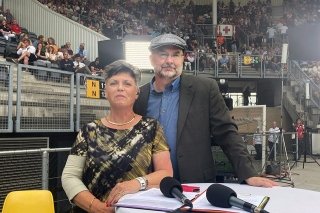Husky marching band director judges internationally
University-wide
Posted

When the COVID-19 pandemic caused everything from school to work to social events to seek out a virtual alternative, many people struggled to see the positive side of the situation.
However, for drumline, color guard, and marching band competitions, this virtual format has been incredibly positive, allowing even more groups to participate than ever before. The new competition format also allowed Gifford Howarth, associate professor of music and director of the Husky Marching Band at Commonwealth University-Bloomsburg, to adjudicate for several international competitions.
In the past year, Dr. Howarth has adjudicated four different competitions in Malaysia, Australia, and the Netherlands—three of these events were held virtually.
The International Malaysia Virtual Band Championships are run and organized by one of Dr. Howarth’s colleagues, Wilson J. L. Tan. To compete, students from Malaysia, Indonesia, Thailand, Taiwan, China, Japan, and the Philippines recorded and submitted videos of themselves. In the first competition, held in the winter of 2020, over 300 students participated; this past year close to 600 students made submissions. “It was an instant success,” said Howarth.
“I watched some of the most impressive performances while judging in the Malaysian competition,” said Dr. Howarth. “You would learn what some of these students were dealing with in their everyday life, and then seeing what they brought musically was honestly tear-jerking.”
Howarth also participated as an adjudicator for the Color Guard Netherlands (CGN) competition. Like the Malaysian competition, participants also submitted videos of their performances. Unlike other competitions, the CGN teams were not connected to schools, but rather to communities. “It would be just as if instead of the Berwick high school team competing, you gathered people from all throughout the Berwick community to compete in the same group,” explained Howarth. “In a single group you could have a grandfather, a father, and then a son all working together from 65 to 12 years old.”
“What was also unique about the CGN competition was that they were one of the only competitions to give actual critiques to the groups,” said Dr. Howarth. “After the show, we would all get together on a ZOOM call with the other judges and the staff working with the group to offer our critiques.” Two American groups entered the CGN competition because the competitions in the United States didn’t offer critiques.
Likewise, the Australian Drumline Competition also offered feedback to groups. However, instead of a live session, Howarth and two other judges from the Winter Guard International (WGI) competition got together and recorded comments for everyone about what they could improve upon.
“The Australian competition really showed how these different competitions are starting to take advantage of technology,” he said. “In the world of drumline and color guard, and all of these different competitions, the WGI is almost like the NFL, and for Australian students to get feedback from judges in this competition will be very beneficial to their future performances.”
Like the other competitions, Howarth adjudicated for, the WGI, a United States-based competition, made the decision to begin hosting virtual competitions. Their first virtual season was successful enough that the WGI has decided to continue with virtual events in addition to their live competitions. “It allows for more groups to participate because now they don’t have to worry about paying for travel and accommodations for competitions; they can just submit their piece,” said Dr. Howarth.
This summer however, the World Music Concert (WMC) in the Netherlands was able to hold their festival live,

and Dr. Howarth was invited not just to judge, but to provide live commentary between performances on the event’s marching band live streams. The WMC is a competition run by the Dutch government. Every four years they hold a three-week-long festival to celebrate and connect musicians from different cultural backgrounds.
“Watching the competitions at the WMC was a truly unique experience,” remarked Dr. Howarth. “We were able to see community groups from the Netherlands compete against high schools from Japan and bands from Canada.”
Overall, Howarth is optimistic about how this new era of virtual competitions will impact the world of music competitions. “COVID opened a door and made us realize that with our technology, we can interact with musicians from all over the world.”



